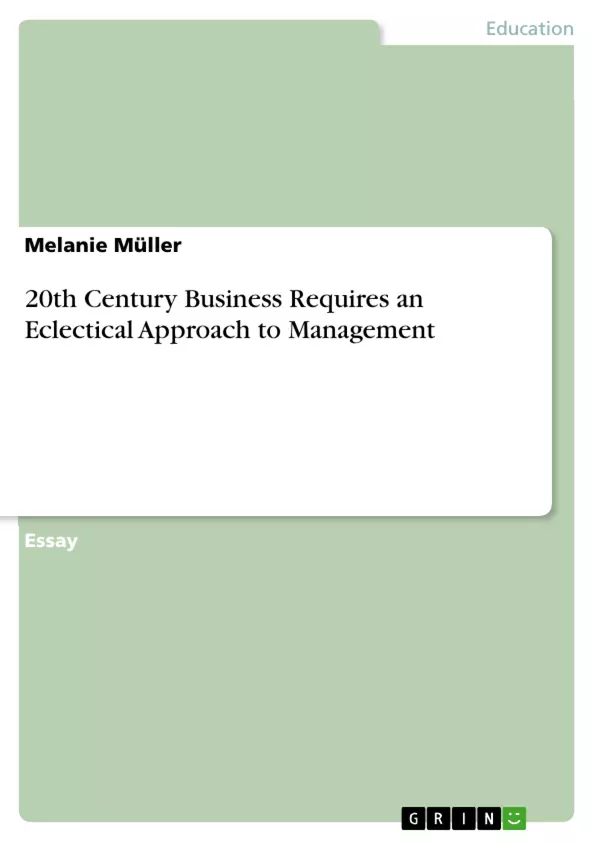The speed of change in all parts of the business in 20th century requires a modification in management styles, too. If you modify the surroundings and requirements you will have to tackle management as well, because various business situations need a different management. Globalization is one of the many reasons why the speed of development and change is rapid and employees change their jobs more often. The society is getting separated into groups: uneducated workers or caseworkers and well educated employees. There are also different cultures in one company, and each culture has different norms and values. The workplaces get more intercultural which leads to new challenges for everyone. Nowadays more and more women are well educated in contrast to other women who like to have a family and work in part-time-jobs. If the modification of business life continues we need to change management styles as fast as we can because such employees call for a special leadership. Leaders play an important role in setting an example for all those values, behaviors and considerations expected from employees. Leaders have to ensure that these changes in an organization are accepted and implemented in a way that not only result in a better job performance but also in general understanding and satisfaction for all. Based on various literature, this essay examines the two management styles, called Management by Delegation and Management by Exception and shows that there are differences between them. Every management style has advantages and disadvantages for a particular business situation in the 20th century which will be described in the following essay.
Inhaltsverzeichnis (Table of Contents)
- Management by Delegation
- Characteristics of Management by Delegation
- Advantages of Management by Delegation
- Disadvantages of Management by Delegation
- Management by Exception
- Characteristics of Management by Exception
- Advantages of Management by Exception
- Disadvantages of Management by Exception
- Cultural Differences in Management Styles
- Conclusion
Zielsetzung und Themenschwerpunkte (Objectives and Key Themes)
This essay aims to analyze two distinct management styles, Management by Delegation and Management by Exception, in the context of 20th-century business. It examines their characteristics, advantages, and disadvantages, highlighting the need for a flexible approach to leadership in a rapidly changing environment.- The influence of globalization and rapid technological advancements on management styles
- The importance of employee education and skill sets in determining the suitability of different management approaches
- The impact of cultural differences on management practices, particularly in terms of communication, work ethics, and employee expectations
- The need for a blended approach to leadership, combining elements of both delegation and exception-based management to effectively address diverse employee needs and work demands
- The critical role of leadership in fostering employee satisfaction, motivation, and performance within a dynamic business landscape
Zusammenfassung der Kapitel (Chapter Summaries)
- Management by Delegation: This chapter delves into the concept of Management by Delegation, highlighting its core principles and characteristics. It analyzes the advantages of this approach, including fostering employee autonomy, promoting critical thinking, and encouraging ownership of work. It also discusses potential drawbacks, such as requiring highly skilled employees, potential for overload, and the need for careful assignment of tasks to match employee capabilities.
- Management by Exception: This chapter explores Management by Exception, outlining its reliance on pre-defined plans and standardized procedures. It emphasizes the advantages of this style, such as relieving management workload, facilitating routine tasks, and minimizing the need for specialized training. However, it also cautions against the potential for employee demotivation, delays in addressing unforeseen issues, and the lack of recognition for successful performance.
- Cultural Differences in Management Styles: This section highlights the importance of considering cultural variations in management approaches. It uses examples from British and German cultures to demonstrate differences in communication styles, work ethics, and expectations. It emphasizes the need for leaders to be sensitive to cultural nuances and adapt their leadership strategies accordingly.
Schlüsselwörter (Keywords)
The essay focuses on the key concepts of management styles, globalization, employee education, cultural differences, leadership, and the need for a flexible and adaptable approach to managing in the 20th century. It explores the practical implications of these concepts on business operations, employee performance, and overall organizational success.Frequently Asked Questions
Why is an eclectic approach to management necessary in the 20th century?
The rapid speed of change in business, driven by globalization and technological advancement, requires flexible management styles that can adapt to different situations and diverse employee needs.
How does globalization influence modern management?
Globalization increases the speed of development, causes employees to change jobs more frequently, and leads to more intercultural workplaces with different norms and values.
What is the difference between Management by Delegation and Management by Exception?
Management by Delegation focuses on employee autonomy and critical thinking, while Management by Exception relies on pre-defined plans and standardized procedures where managers only intervene when deviations occur.
What are the advantages of Management by Delegation?
It fosters employee autonomy, promotes critical thinking, and encourages a sense of ownership over one's work, though it requires highly skilled staff.
What role do leaders play in organizational change?
Leaders set examples for expected behaviors and must ensure that changes are implemented in a way that results in both better performance and general employee satisfaction.
How do cultural differences impact leadership styles?
Cultures have different communication styles and work ethics; for example, German and British management styles differ in their expectations and communication nuances.
- Quote paper
- Melanie Müller (Author), 2010, 20th Century Business Requires an Eclectical Approach to Management, Munich, GRIN Verlag, https://www.hausarbeiten.de/document/189242


